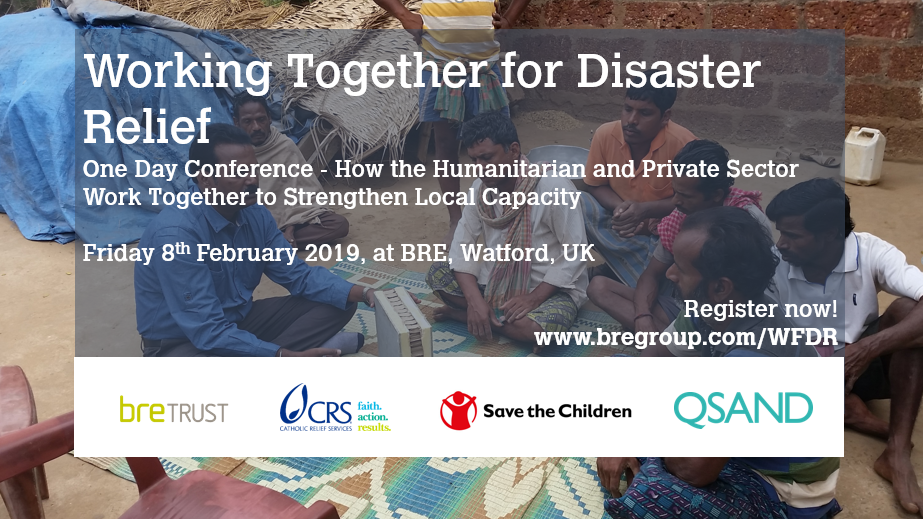
How can the private sector better work with the humanitarian sector in pre- post-disaster reconstruction and development to reinforce local ownership and support localisation ?
The need for humanitarian organisations to engage more with the private sector and vice versa – including environment professionals, financial services, manufacturers & suppliers – in post-disaster reconstruction and development is well known. This was reinforced in a study from the United Nations Office for the Coordination of Humanitarian Affairs (UNOCHA) on the business case for companies to engage in humanitarian response https://www.unocha.org/story/business-case-companies-engage-humanitarian-response
Following this there is still need for practical guidance on how our sectors can better work together. The move toward ‘localisation’, driven by both National and International NGOs, to practically implement changes to the way the humanitarian system operates in order to enable a more locally-led response, would also include the private sector. This can include professional and financial services, manufacturers, suppliers, and contractors, both international and local. For more information on localisation, view: https://charter4change.org/.
This one-day conference is an opportunity for the private and humanitarian sectors to meet and consider how to work together to support and develop local capacity for longer term sustainability and resilience. It will take the form of presentations about current and proposed initiatives and collaborative workshops discussing various issues related to collaboration between humanitarian, governmental, academic, and private partners.
With the impact of climate change becoming increasingly apparent, humanitarian partnerships with private sector companies are set to the rise. This conference is focused on sharing information about, identifying and promoting effective ways for the private and humanitarian sectors to better collaborate to promote outcomes which support and reinforce localisation.
Attendance is free for the humanitarian, NGO and charity sector, with only a modest fee for private sector partners. It takes place at BRE, one of the world’s leading built environment research and testing organisations, with a mission to improve the built environment for all. BRE is also the developer of QSAND, on behalf of IFRC, which is the freely available shelter and settlement sustainability and resilience tool to aid disaster reconstruction. BRE’s demonstration facilities include a life-size, walk-through humanitarian shelter, which will be available for viewing during the conference..
Note: humanitarian organisations and charities qualify for a free place at this event, up to 2 individuals per organisation, contact us at qsand@bre.co.uk for a discount code to give you a free place.
Event programme
| 8.30 – 9.00 | Arrival and Coffee |
| 9.00 – 9.10 | Welcoming remarks – Yetunde Abdul, QSAND Programme Manager |
| 9.10 – 10.55 | Scene Setting Presentations Morning Session: outline of the themes to be discussed in breakout sessions and overview of day. This session will cover: Localisation and Why it is Important, Jamie Richardson, Catholic Relief Services Making Public-Private Humanitarian Partnerships Work, Jessica Wadd, Vantage Partners Supporting the Early Response Phase – the First Eight Weeks on the Ground, Jeremy Foster, Urban Hub The Broader View of Private Sector Engagement, Christopher Hoffman, World Vision International Localisation in Nepal – Experiences from the Field (live link up with representatives in Nepal and in-person presentations from local actors)
|
| 10.55 – 11.10 | Coffee Break |
| 11.10 – 12.25 | Breakout Sessions 1 For this session, you will be able to choose which discussion group you participate in: A: Research and Development Facilitated by: Oxford Brookes University With presentations by: Bath University, Mott MacDonald, Oxford Brookes University B: Supporting Local Enterprise and Building Capacity Facilitated by: Catholic Relief Services, Save the Children With presentations by: RedR, Catholic Relief Services, Save the Children C: Construction and Infrastructure Sector Engagement Facilitated by: BRE With presentations by: Arup, Better Shelter, BRE D: Financial Services, Technology and Operations in Post-Disaster Reconstruction Facilitated by: Catholic Relief Services, Habitat for Humanity With presentations by: EcoBank, Red Rose, Habitat for Humanity Please note: after lunch you will have the chance to participate in a second session. |
| 12.25 – 13.10 | Lunch |
| 13.10 – 14.25 | Breakout Sessions 2 For this session, you will be able to choose which discussion group you participate in: A: Research and Development Facilitated by: Oxford Brookes University With presentations by: Bath University, Mott MacDonald, Oxford Brookes University B: Supporting Local Enterprise and Building Capacity Facilitated by: Catholic Relief Services, Save the Children With presentations by: RedR, Catholic Relief Services, Save the Children C: Construction and Infrastructure Sector Engagement Facilitated by: BRE With presentations by: Arup, Better Shelter, BRE D: Financial Services, Technology and Operations in Post-Disaster Reconstruction Facilitated by: Catholic Relief Services, Habitat for Humanity With presentations by: EcoBank, Red Rose, Habitat for Humanity |
| 14.25 – 15.25 | Speed networking and session feedback – time to pair up with someone who was not in your breakout sessions and summarise the discussions for them, as well as meet some new people. |
| 15.25 – 15.40 | Coffee break |
| 15.40 – 16.40 | Panel discussion Feedback from breakout sessions Open space / panel – feedback from the breakout sessions – questions / concerns raised in these sessions will be fed back to the panel to discuss. Audience Q&A and “Question Time” style panel. Reflections on day and next steps. Chair: Charles Parrack, Oxford Brookes University Panellists: Deborah Pullen – BRE Trust Christopher Hoffman – World Vision International Jeremy Foster – Urban Hub Jessica Wadd – Vantage Partners Andy Powell – Save the Children Shuva Sharma – Scott Wilson Nepal |
| 16.40 – 17.00 | Plenary and wrap up – Yetunde Abdul, QSAND Programme Manager |














